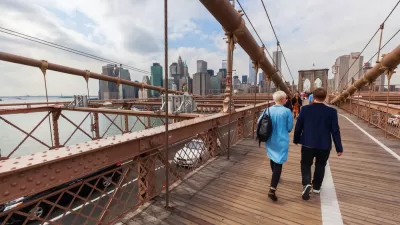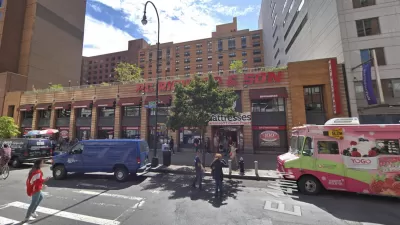The eagerly anticipated addition of a $2 billion campus for Cornell on Roosevelt Island will include a gesture toward the new model of innovation economy that directly connects universities with their cities.
Jessica Leber reports on a critical component of Cornell's new $2 billion campus on Roosevelt Island in New York City—a "corporate co-location" building that will make a literal connection between academia and corporate interests. The Bridge, as the building is called, is one of three buildings scheduled to open in 2017 as part of the project's first phase.
Leber got the scoop on the name of the building prior to a groundbreaking ceremony held on June 16, and a promo video is also available online that teases the concept.
Leber explains a little more about what makes the building unique in the crowded New York City commercial real estate market:
"The Bridge is unusual for New York office space in that it doesn't have pre-leased anchor tenants other than Cornell Tech. The companies in the building will be carefully curated by Forest City Ratner, in discussions with the university. The goal is to bring in an eclectic mix of startups (ideally involving the school's graduates) and larger companies working on applications that match Cornell’s program areas: connective media, the built environment, and health tech."
The article also includes renderings of the new building and some description of design details by Leber.
FULL STORY: Introducing The Bridge, The Innovation Hub Of New York City's $2 Billion Tech Campus

Alabama: Trump Terminates Settlements for Black Communities Harmed By Raw Sewage
Trump deemed the landmark civil rights agreement “illegal DEI and environmental justice policy.”

Planetizen Federal Action Tracker
A weekly monitor of how Trump’s orders and actions are impacting planners and planning in America.

Why Should We Subsidize Public Transportation?
Many public transit agencies face financial stress due to rising costs, declining fare revenue, and declining subsidies. Transit advocates must provide a strong business case for increasing public transit funding.

Understanding Road Diets
An explainer from Momentum highlights the advantages of reducing vehicle lanes in favor of more bike, transit, and pedestrian infrastructure.

New California Law Regulates Warehouse Pollution
A new law tightens building and emissions regulations for large distribution warehouses to mitigate air pollution and traffic in surrounding communities.

Phoenix Announces Opening Date for Light Rail Extension
The South Central extension will connect South Phoenix to downtown and other major hubs starting on June 7.
Urban Design for Planners 1: Software Tools
This six-course series explores essential urban design concepts using open source software and equips planners with the tools they need to participate fully in the urban design process.
Planning for Universal Design
Learn the tools for implementing Universal Design in planning regulations.
Caltrans
Smith Gee Studio
Institute for Housing and Urban Development Studies (IHS)
City of Grandview
Harvard GSD Executive Education
Toledo-Lucas County Plan Commissions
Salt Lake City
NYU Wagner Graduate School of Public Service





























